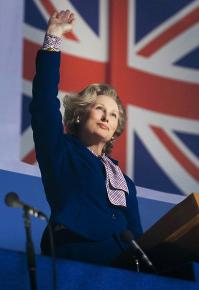Margaret Thatcher, class warrior
reviews the film Iron Lady about the former British prime minister.
I FIRST heard of Margaret Thatcher 40 years ago when I was a high school student in Britain. Thatcher was at that time the minister of education in Edward Heath's Conservative government, and she became notorious for ending the practice of giving British children free milk at school.
"Margaret Thatcher, milk snatcher," became one of the most widely known political chants of the decade.
After that, Thatcher only went down in my estimation.
In 1975, a year after mass strikes had driven Heath from office and returned the Labour Party to government, Thatcher became leader of the opposition and helped push British politics sharply to the right.
Four years later, she became Britain's first (and so far, only) woman prime minister. For the next 11 and a half years, she enacted brutal neoliberal policies that included sharp cuts in social spending, tax cuts for the rich, deregulation of the financial sector, attacks on unions, and a huge increase in poverty and inequality.
She was finally forced to resign by members of her own party after her attempt to introduce a poll tax led to a non-payment campaign, mass demonstrations and riots.

I WENT to see Iron Lady, the new movie about Thatcher's life a few hours after a dentist's appointment, and thought that I would enjoy the experience about as much, but the movie turned out to be better than I expected.
This is partly because Meryl Streep does a convincing job portraying Thatcher, both as prime minister and as a doddering old lady hallucinating about her dead husband and reliving her life in flashbacks. And the flashbacks themselves make use of documentary footage of some of the major political events of the 1980s, including several of the strikes, demonstrations and riots that Thatcher's policies provoked.
But the events themselves will likely be very confusing to a U.S. audience, because they aren't shown chronologically, and there is very little context for most of them.
The film is not an attempt to glorify Thatcher or justify her politics--more an effort to shed light on her psychology and what made her tick. But in that, it is only partially successful.
We see her absorbing the middle-class prejudices of her father, a grocer who later became mayor of the small town where she grew up. Those prejudices included his hostility to government programs that benefited the poor and the working class.
We also see her confronting the ingrained sexism of the society in which she grew up. But Thatcher's response was to become more like the ruling-class men who initially didn't take her seriously. And by the time she was a national politician, she supported policies that hurt the vast majority of women.
Thatcher became an unwavering warrior for the British capitalist class, willing to use racism and nationalism to push through its agenda. Iron Lady glosses over a lot of this. We don't see Thatcher fanning the flames of anti-immigrant racism in the run-up to the 1979 election, for instance.
In her first few years in office, Thatcher became enormously unpopular, but she whipped up nationalism around Argentina's invasion of the Falkland Islands (or Malvinas) in 1982. These were territories that the British Empire has seized in the 19th century. They had no strategic or economic value and only a few hundred inhabitants. Britain had no right to them, but at great expense, Thatcher sent a huge military task force to recapture them, killing hundreds of Argentinians in the process.
The movie gives the impression that Thatcher was motivated by principle, but it was a calculated political gamble to win the next election. It worked, in part because the opposition Labour Party fell in line behind Thatcher and supported the war.
Still, Streep does capture some of Thatcher's arrogance and ruthlessness--her willingness to allow Irish political prisoners fighting for better prison conditions to starve themselves to death, for example.
Her arrogance was finally her undoing, after she ignored advice that a poll tax would be political suicide. Leading figures in her own party realized that she had become so unpopular that she had to go or the Conservatives would be wiped out in the next election.
Some reviewers have said that by showing Thatcher as an old frail lady close to death, the movie shows her in a sympathetic light. That was not my impression. Instead, I thought the movie helped cut Thatcher down to size.


